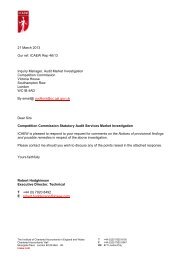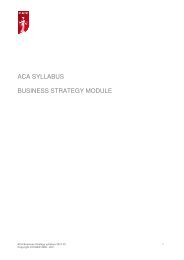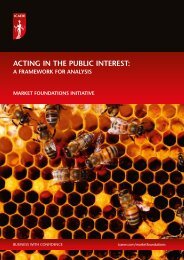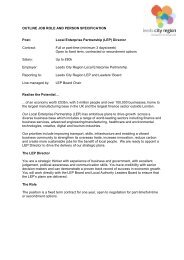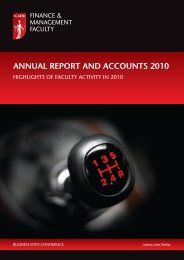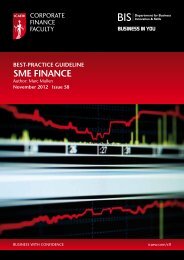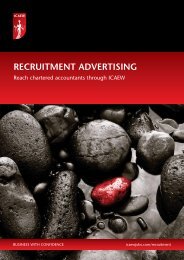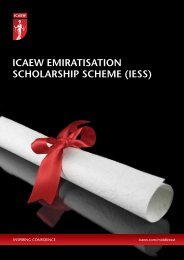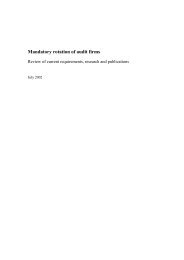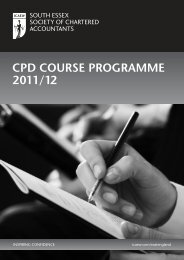Auditor independence and non-audit services - ICAEW
Auditor independence and non-audit services - ICAEW
Auditor independence and non-audit services - ICAEW
You also want an ePaper? Increase the reach of your titles
YUMPU automatically turns print PDFs into web optimized ePapers that Google loves.
firms have, over the last 10 years, transformed themselves from <strong>audit</strong> firms into multidisciplinaryprofessional service organisations <strong>and</strong> the issue of <strong>audit</strong>or <strong>independence</strong> hasstrongly re-emerged as a concern (Kornish <strong>and</strong> Levine, 2000). Jeppesen (1998) furtherargues that changing <strong>audit</strong> methodologies in the larger firms are blurring the boundariesbetween <strong>audit</strong>ing <strong>and</strong> consulting <strong>and</strong> undermining the <strong>independence</strong> of the <strong>audit</strong> processitself.It is also interesting that an Independent Oversight Board (IOB) set up by Andersen in theUS, after the Enron problems emerged but before the firm collapsed, recommended thatsome consulting <strong>services</strong> provided by the firm should be separated into partnershipsmanaged independently from <strong>audit</strong> partners <strong>and</strong> without financial interdependence(Andersen, 2002). Some <strong>services</strong> remaining in the <strong>audit</strong> practice should not be providedto <strong>audit</strong> clients. 1 However, the main thrust of the IOB’s recommendations was astrengthening of internal quality control over <strong>audit</strong>ing throughout the firm.1.3 The current UK regulatory <strong>and</strong> professional environmentAudit firms have defended themselves robustly against criticism that NAS undermines<strong>independence</strong>, insisting that integrity is crucially important to their existence.Representatives of the UK profession have also warned against over-reacting byassuming those problems arising in the US will automatically occur in the UK, where theregulatory framework is different. At the same time there is a recognition of the need toreview <strong>and</strong> make changes to the UK framework where it is deemed necessary (Wyman,2002). The Chairman of the UK Financial Services Authority (FSA) stated that the FSAintended to consult on the current UK provisions in relation to NAS (Davies, 2002).There are also indications that, post Enron, company boards are willing to pay higher<strong>audit</strong> fees for higher levels of assurance, but at the same time some boards are buyingfewer NAS from their <strong>audit</strong>ors (Parker, 2002).The regulatory framework in the UK in respect of NAS is two-pronged. First, listed <strong>and</strong>other large companies have, since 1992, 2 been required to disclose in their annual reportthe amount of NAS fees paid to their incumbent <strong>audit</strong>or. Second, the <strong>audit</strong>or<strong>independence</strong> framework, to which all UK registered <strong>audit</strong>ors must adhere, providesguidance as to which NAS an <strong>audit</strong> firm can provide, with appropriate safeguards,without compromising <strong>independence</strong>. The <strong>services</strong> for which adequate safeguards cannotbe put in place are not allowed. The EC’s recent Recommendation on Statutory <strong>Auditor</strong>s’Independence (EC, 2002) suggests that NAS disclosure should be further broken downinto assurance, tax advisory <strong>and</strong> other, with details being provided as to the compositionof ‘other’. The Recommendation also restricts the range of NAS that an <strong>audit</strong> firm should1 The <strong>services</strong> which the IOB recommended should not be provided by the <strong>audit</strong> practice were: substantialinformation <strong>and</strong> communication technology (ICT); strategic planning; the practice of law; executiverecruitment; <strong>and</strong> certain areas of ‘aggressive’ tax planning <strong>and</strong> advocacy unrelated to <strong>audit</strong>. The <strong>services</strong>which should remain in the <strong>audit</strong> practice but not be provided to <strong>audit</strong> clients are: outsourced internal <strong>audit</strong>;executive taxation; <strong>and</strong> limited ICT design for smaller clients. Services which should continue to beprovided to <strong>audit</strong> clients are: tax preparation <strong>and</strong> compliance; due diligence; <strong>and</strong> valuation of assets <strong>and</strong><strong>audit</strong>ing of employee benefits as permitted by regulation.2 It is interesting that disclosure of <strong>non</strong>-<strong>audit</strong> <strong>services</strong> fees in the US (apart from a earlier brief period) wasnot required until the SEC revised its <strong>independence</strong> rules in 2000 (SEC, 2000).2



